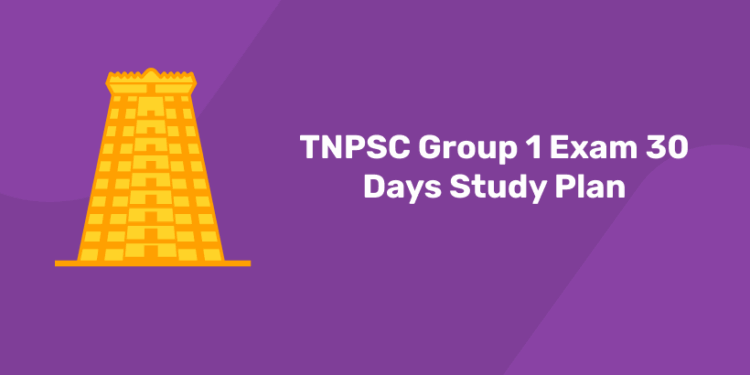Table of Contents
Tamil Nadu PSC is the exam conducting official for all group exams in Tamil Nadu. Group 1 exam is the exam for top-grade posting in Tamil Nadu civil services and police services. Aspirants who are preparing for the Group 1 2025 exam should have a bachelor’s degree from any recognized university. Group 1 exam follows a two-tier system with the preliminary exam on the first tier and a mains exam along with an oral test on the second tier. The lower age limit for writing the exam is 21 and the upper limit is 32 years. Age relaxation is there as per community reservation. For aspirants, who are striving to grab the top grade job, we provide you with a smart TNPSC Group 1 Exam 30 Days Study Plan.
TNPSC Group 1 Exam Syllabus
Candidates have to qualify for the preliminary exam with a minimum qualification mark. Those who qualify in prelims can write the mains exam. One should get a minimum qualifying mark in mains too for getting enlisted in the selection list. For the preliminary exam, the syllabus includes general studies and aptitude. For the mains exam, there are three descriptive papers based on general studies. For more details regarding the exam syllabus, exam pattern, and eligibility criteria, follow this page.
TNPSC Group 1 Exam 30 Days Study Plan
After a thorough study, candidates can revise the whole syllabus within 30 days by following a smart study plan. Here, we provide you with a smart 30 days plan.
TNPSC Group 1 Study Plan – Day 1-30
| Days | History(1 hr) | Geography(45 min) | Economics (30 min) | Polity (40 min.) | Science (60 min) | Aptitude & Resoning (1hr) | Current Affairs(1 hr) |
| Day1 | Jainism | Population | Banking in India | Constitution of India | General Scientific laws‐Scientific instruments-1 | HCF‐LCM‐Ratio and Proportion | January month |
| Day2 | Buddhism | Nicknames of important Indian Places | RBI, NABARD | The preamble to the constitution | General Scientific laws‐Scientific instruments-2 | Number Series‐ Logical Number/Alphabetical/Diagramma ic Sequences | January month |
| Day3 | Delhi Sultans | waterfalls in India | Indian Currency System | Salient features of the constitution | Physical quantities, standards | Conversion of information to data | January month |
| Day4 | The Mughal Empire-1 | Sanctuary & Biosphere reserve in India | Social Welfare Schemes-1 | Fundamental rights‐1 | Units‐Force, motion and energy | Direction | February month |
| Day5 | The Mughal Empire-2 | Important Straits of the world | Social Welfare Schemes-2 | Fundamental rights‐2 | Chemistry of ores and metals‐Carbon, nitrogen and their compounds | Problems on ages | February month |
| Day6 | Indus valley civilization | Airports in India | Major Agricultural Revolutions | Fundamental duties | Fertilizers, pesticides, insecticides | Simplification‐Percentage | February month |
| Day7 | Recall the topics | Revision | |||||
| Day8 | Advent of European invasion, Expansion and consolidation of British rule | Forest & Wildlife | Rural Development Programmes | Judiciary in India-1 | Elements and Compounds‐Acids, bases and salts‐ | Puzzles‐Dice‐Visual Reasoning | March month |
| Day9 | Effect of British rule on socio‐economic factors | rivers in India | Women Empowerment Programmes-1 | Judiciary in India-2 | Mechanics and properties of matter | Alphanumeric Reasoning | March month |
| Day10 | Indian National Movements | Natural vegetation | Women Empowerment Programmes-2 | Union legislature | Inventions and discoveries‐ National scientific laboratories | Simple interest‐Compound interest‐ | March month |
| Day11 | Social reforms and religious movements | Major crops and producing states | Census 2011 | State Legislature | Main Concepts of life science | Data Interpretation | April month |
| Day12 | South Indian history‐Culture and Heritage of Tamil people | Soil, minerals & natural resources | Five year Plan-1 | Indian federalism | The cell‐basic unit of life | Distance, speed & time | April month |
| Day13 | Arts, Science, literature and Philosophy | Natural calamities | Five year Plan-2 | Union, State and territory | Classification of living organism | Time and Work | April month |
| Day14 | Recall the topics | Revision | |||||
| Day15 | Political parties and populist schemes | Disaster Management | National Income of India | Parliament‐ State executive‐ | Environment, ecology, health and hygiene, Bio‐ diversity and its conservation | Logical Reasoning | May month |
| Day16 | Growth of rationalist, Dravidian movement in TN | weather and climate | Methods of Measuring National Income | Panchayat raj, Municipality | Atomic and nuclear physics. | Area‐Volume-1 | May month |
| Day17 | Cultural Heritage in India | Monsoon, rainfall | Economic trends in Tamil Nadu | Elections ‐ Election Commission Union and State | Oxidation and reduction‐Chemistry of ores and metals‐ | Area‐Volume-2 | May month |
| Day18 | Important National Leaders-1 | Earth and Universe | Economic trends in India | Emergency provisions,lok‐adalats, Ombudsman | electricity and Magnetism ‐Heat, light and sound‐ | Trignomentry | June month |
| Day19 | Important National Leaders-2 | Solar system‐Atmosphere hydrosphere, lithosphere | Finance commission | Anti‐corruption measures – Central Vigilance Commission | Genetics the science of heredity | Profit & Loss | June month |
| Day20 | The Mauryan Empire | Important lakes in India | Nature of Inidan Economy | Central and State Commission‐ Empowerment of women | Blood and blood circulation | Average, Calender | June month |
| Day21 | Recall the topics | Revision | |||||
| Day22 | Prominent personalities in the various spheres | Capital & Currency | Land Reforms & Agriculture | Comptroller and Auditor General of India | circulation‐Endocrine system‐Reproductive system | Problems on trains | July month |
| Day23 | Characteristics of Indian culture | National parks in India | Application of science in agriculture | Amendments to constitution-1 | Communicable diseases and noncommunicable diseases | Probability | July month |
| Day24 | Organizations for fine arts, dance, drama, music | Cultures in India | Industrial growth | Amendments to constitution-2 | Human diseases, prevention and remedies | Decision making and problem solving | July month |
| Day25 | Years of India’s Freedom Struggle | Important Organization in india | Unemployment, Poverty | Schedules to constitution | Universe, Science glossary | Algebra | August month |
| Day26 | previous year QP | previous year QP | previous year QP | previous year QP | previous year QP | previous year QP | August month |
| Day27 | previous year QP | previous year QP | previous year QP | previous year QP | previous year QP | previous year QP | August month |
| Day28 | Mock Test-1 | Mock Test-1 | Mock Test-1 | Mock Test-1 | Mock Test-1 | Mock Test-1 | September Month |
| Day29 | Mock Test-2 | Mock Test-2 | Mock Test-2 | Mock Test-2 | Mock Test-2 | Mock Test-2 | September Month |
| Day30 | Mock Test-3 | Mock Test-3 | Mock Test-3 | Mock Test-3 | Mock Test-3 | Mock Test-3 | September Month |
So above given is the basic study plan for a month. Candidates can also go through the detailed 60 days study plan and 90 days study plan.
Frequently Asked Questions
How can the TNPSC Group 1 30 Days Study Plan help candidates?
The 30-day plan offers a structured schedule for effective revision. It covers all major subjects like History, Polity, Geography, and Science. Each day is divided into time slots for balanced learning. Regular mock tests and revision days improve memory retention. This plan helps aspirants stay disciplined and exam-ready within one month.
What subjects are included in the TNPSC Group 1 30 Days Study Plan?
The plan includes seven main areas for preparation. These are History, Geography, Economics, Polity, Science, Aptitude, and Current Affairs. Each subject has a specific daily time allocation. Candidates revise major topics weekly to reinforce learning. The plan also integrates mock tests to assess progress effectively.
How should aspirants use mock tests in the 30 Days Study Plan?
Mock tests simulate the actual exam environment for better time management. They help candidates analyze weak topics and improve accuracy. The last three days are dedicated to full-length mock tests. These tests help build confidence and reduce exam stress. Regular practice with analysis ensures a higher chance of qualifying for the next stage.












